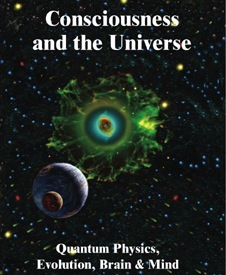|
|
|||||||||||||||
Journal of Cosmology, 2010, Vol 7, 1785. JournalofCosmology.com, May, 2010 Famed astrophysicist Dr. Stephen Hawking has voiced concern about the dangers, he believes, are posed by alien predators who may arrive in giant space ships, to conquer, enslave, destroy, colonize, and voraciously exploit the resources of Earth. According to Hawking:
8. Why Should Hawking's Aliens Wish To Destroy? GianCarlo Ghirardi, Ph.D., Dept. of Physics, University of Trieste, the Abdus Salam ICTP, Trieste, Italy. It is my firm conviction that, in principle, there are no reasons to exclude that there might be living creatures on other planets or celestial bodies in the cosmos. Yet why should they wish to target and destroy the inhabited planets of the universe? To better focus the general issue let us take into account that our existence on Earth is surely quite limited on cosmological time scales, modern humans have existed for less than an eye-blink of cosmological time, and that the cosmos has a radius of various billions of light years, as well as the fact that nothing can travel faster than light. Therefore, if these hypothetical alien beings have lived in a similar time span, then the probability that by endless travel they might reach us now or in any reasonable time interval from now, is infinitesimally small. So it seems to me that Hawking's hypothesis is not unreasonable but is more in the realm of science fiction than a realistic scenario. Hawking has raised several issues which appear to me to be rather obscure and confusing. If aliens are microbes or human, why would these aliens wish to destroy human life? If an alien civilization has been able to build giant spaceships which can travel through space for many many light years and have built destructive devices which would allow them to conquer, enslave, destroy and colonize the terrestrials of Earth, then their civilization must surely be more advanced, from a scientific and technological point of view, than ours. This point of view makes also me inclined to believe that these aliens could not be like microbes or insects, at least to the extent in which we attach a precise meaning, based on our experience, to these terms. There is no evidence that microbes or insects look to the heavens and ponder questions such as "are we alone", nor is there any suggestion they would be interested in space travel. These are "human" attributes which we must not impart upon hypothetical aliens. And if Hawking's aliens are anything like humans, then I am optimistic, in a certain sense, that their scientific development should be accompained also by an ethical development, and might value life. Certainly these beings would realize that there is life on the earth, and would not be motivated to authomatically enslave or destroy other living beeings, as these are rather primitive, unthinking, reactions, and not the mark of what we might expect of a higher culture and ethics. And if life is everywhere, then it might be expected that these alien wanderers would not only see it as pointless to destroy life, but might develop a respect for all the living creatures they would have met in their endless travel. Curiosity and the desire to acquire knowledge does not equate a desire to conquer and destroy. The first "aliens" we encounter may not even be alive. I believe that a civilization which has developed robots is a civilizations of intelligent beings. Accordingly, they might very well send robots to explore the cosmos. However, this again presents us with the problem of time. The time needed to journey to Earth from the nearest solar system in which intelligent life might have been evolved, is enormous, and probably comparable to the total period of existence of the considered intelligent species. Then, which would be the purpose of sending robots to such far away regions of the cosmos that the time necessary for these robots to send back the information concerning what they have discovered would bypass the probable period of existence of the aliens of the home planety who have sent them around? Accordingly, it also seems reasonable to assume that Hawking's giant spaceship would contain both robots and their intelligent builders. Therefore, they might take their civilization with them. However, unless they have discovered the secret of eternal life and cannot evolve or change, they again might change their minds before they reach Earth, and decide not to conquer or destroy. So, there is the possibility they could come in peace and also the one that they change their minds during the many lights years such a journey would take. I am perfectly aware of the fact that I am tackling the problem by assuming a perspective that reflects, to a great extent, our present knowledge of the cosmos and of the natural and biological laws. An easy objection would be to configure the development of hybernation techniques allowing to preserve a living being for billions of years or to suggest that presently unknown topological structure of the cosmos would allow faster than light travels. And then there is the idea of "shoot first and ask questions later", a view which I do not endorse. I believe that action must be preceded by knowledge and reflection even in the case in which this might imply serious risks of destruction.
|
|
|
|
|
|
|
|
 Colonizing the Red Planet ISBN: 9780982955239 |
 Sir Roger Penrose & Stuart Hameroff ISBN: 9780982955208 |
 The Origins of LIfe ISBN: 9780982955215 |
 Came From Other Planets ISBN: 9780974975597 |
 Panspermia, Life ISBN: 9780982955222 |
 Explaining the Origins of Life ISBN 9780982955291 |












